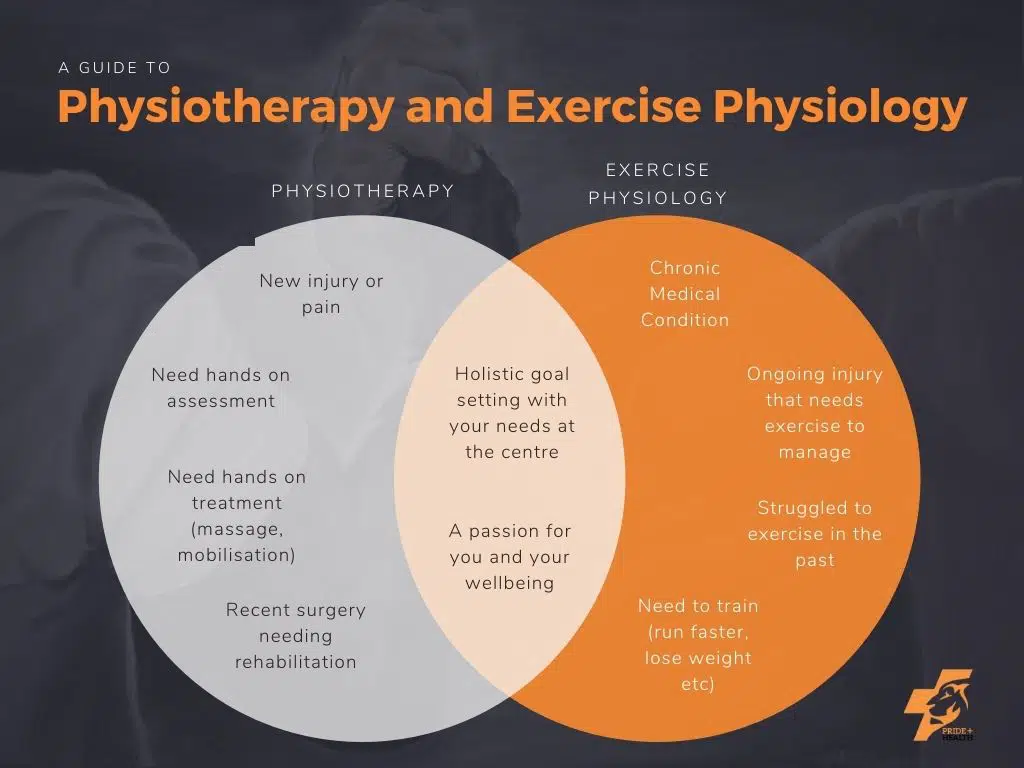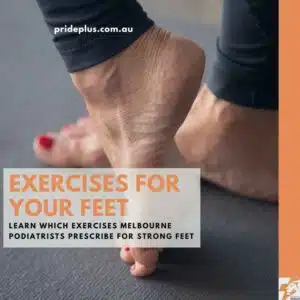If you’re not sure whether you need to see a physiotherapist or an exercise physiologist then you’ve come to the right place. Here, we’ve created a fast, interactive quiz for you to find out who is the best person to help you achieve your goals. We’ve also created a Venn diagram as well as a guide to show just what the difference between a physiotherapist and an exercise physiologist is.
The answers to the quiz will help you find not just whether a physio or an EP is the perfect person to help you, but which programs would best suit you. Try it out for yourself.
Start here: Physio or EP Quiz
Quiz not loading above? Some browsers require you to open the quiz in a new window. You can do that by clicking here.
Similarities between physiotherapists and exercise physiologists
There’s quite a few similarities between physiotherapists and exercise physiologists. Both are allied health professions where your goals are established and worked towards.
Physios and EPs are university trained and registered health professionals here in Australia. The amount of time spent at University and on placements to study to become either is similar too. Courses vary a bit but 3 – 4 years of undergraduates study is required to become either a physiotherapist or exercise physiologist.
The conditions that exercise physiologists and physios treat are similar too. You might see one or both for your sore back, knee pain, rehabilitation post surgery or an exercise program after your ankle sprain.
And funding to see both EPs and physios is almost the same. Both professions provide one on one and group classes. Both are recognised by Medicare, private health insurers, and government bodies such as DVA, TAC and Worksafe.
To continue to be registered as a physiotherapist or an exercise physiologist you must meet strict ongoing professional education requirements.
So, considering there are so many similarities between physiotherapists and exercise physiologists, how do you know which one to see first? What are the differences?
Physiotherapy is best at…
Physios are best at helping you when you’ve suffered an injury and you need an assessment and treatment plan. If your injury or pain is new or increasing in severity than a physiotherapist is the ideal person to see to find out what is going on and start treating it.
If you’ve woken up and your back is all of a sudden sore? Or your elbow is playing up during tennis? Maybe your knee is giving you curry walking down the stairs? These are all good reasons to start with a trip to your physiotherapist.
Your physio is the best person to assess just what is happening. If you already have a diagnosis, your physio will help you discover not just what has happened, but why. Then, together you’ll start your journey back.
Hands on massage, manipulation, mobilisation and assessment form an integral part of many (particularly first) physiotherapy sessions. Exercise prescription is also the domain of your physiotherapist who will work with you during the acute (early) phases as well as long term.
Physiotherapy is also the best at coordinating your care with other health professionals. For many of us our first visit to a health professional when we’re sore is to our physios. As we progress out treatment we often require the intervention of others, whether that be a podiatrist for foot and ankle issues or our friends the exercise physiologists to advise around ongoing exercise needs.
Exercise physiology is best at…
EPs are by far the best at delivering life changing results via exercise. For many of us the barrier to achieving our goals isn’t purely knowing what exercise to do. It’s about finding the right exercise and breaking down the right barriers. Putting in place the habits, the goals and the strategy to help you feel better.
For those with chronic medical conditions such as diabetes, osteoporosis, anxiety or heart and lung issues exercise is not just a nice thing to do, it’s vital. But the time, stress and pressure of managing a chronic medical condition can eat into that vital exercise time. An exercise physiologist is not only able to help you strategise when to exercise, but they can prescribe the dosage of exercise that will help you best manage, overcome or thrive with your condition.
In many ways exercise physiologists have as many similarities with personal trainers as they do physiotherapists. You go to a personal trainer because you want to feel better and have someone guide you there. Well, an exercise physiologist will not only push, train and coach you, they have the background in health and medicine to understand just what your body needs.
If you’re seeing an exercise physiologist regularly you can expect to feel better as you train together. Strengthening your body and mind and achieving your goals.

Now you know the difference between a physiotherapist and an exercise physiologist, which one do you need to see?
If you’ve completed the quiz above you’ll have a clear understanding of whether you need to see a physiotherapist or an exercise physiologist. The next steps are to choose time, a place and a professional that places your needs as their number one priority.
For that you can book in online with your physiotherapy or exercise physiology team member. You’ll be taking your first steps to establishing your goals and feeling better.
If you have completed the quiz above here’s some more guidance.
You might benefit from a physiotherapist most if:
- You have a new pain or injury that requires an assessment, diagnosis or hands on treatment.
- You’ve just suffered a new sports injury or have a recent surgery to bones, muscles, tendons or joints.
- Touch in the form of hands on manipulation, massage, mobilisation is required.
Whereas you might benefit from an exercise physiologist most if:
- You’re looking to feel better an overcome a chronic health condition. Examples include diabetes, osteoporosis, metabolic conditions or weight management, hypertension and high cholesterol.
- An exercise program is needed to achieve sporting or life goals. Running plans, muscle hypertrophy, improving flexibility and more.
- You’ve struggled in the past to have a good relationship with physical activity and exercise. EPs are like the coach, trainer and psychologist you need all rolled up in one package.
- A long term injury that requires regular exercise to manage. Think persistent back pain or arthritis which requires consistent and appropriate exercise prescribed by an expert.
- You keep falling over, or have a fear of falling.
We’ve written extensively on our physiotherapy and exercise physiology pages about what you can expect when you attend your first session together. What is most important to us, no matter which profession you see, is you. We’ll want to find out just what you want, need and how we can help you get it.
Ready to get started?
By now you know whether it will be a physiotherapist or exercise physiologist who will be your first port of call. Well, what are you waiting for?
You can book in online with either discipline or call our clinics to choose a time that suits you.
Meet your physiotherapists


Your physiotherapists in Pascoe Vale are Naveena and Mouhamed. Both Naveena and Mo are passionate about getting you back on track with clear goals, communication and diagnosis of your problems.
Meet your exercise physiologists


In Pascoe Vale your exercise physiologists are Aidan and Mike. Both Aidan and Mike thrive on helping you identify your goals and then being part of your journey to achieve them.
Like to know more?
If you would like to know more about any of our disciplines or how you can improve your health you can find lots of great information on our blog. Here’s a couple of our most popular pieces
- Sugar Burners🔥 Diabetes Program – How you can feel better, smash your blood sugars and impress your GP (with your diabetes control).
- Online Heel Pain Test – Find out what is causing your heel pain for free
- The Best Running Shoes For Ball of Foot Pain – Forefoot pain is incredibly common and getting the right shoes can help.
- Custom Orthotics now come with a guarantee – find out what this means for your sore feet




